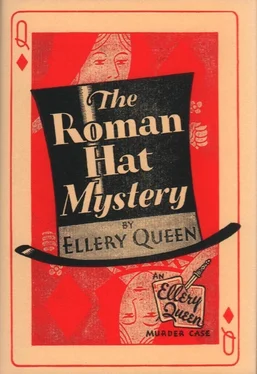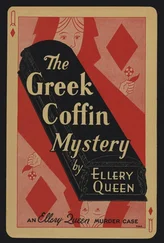“I’m— I’m sorry, Inspector,” he muttered, dabbing his face with a handkerchief. “It was — quite a surprise.”
“Evidently,” said Queen dryly. “You couldn’t have acted more surprised if the earth had opened under your feet. Now, Morgan, what’s this all about?”
The lawyer continued to wipe the perspiration from his face. He was shaking like a leaf, his jowls red. He gnawed at his lip in indecision.
“All right, Inspector,” he said at last. “What do you want to know?”
“That’s better,” said Queen approvingly. “Suppose you tell me when you last saw Monte Field?”
The lawyer cleared his throat nervously. “Why — why, I haven’t seen him for ages,” he said in a low voice. “I suppose you know that we were partners once — we had a successful legal practice. Then something happened and we broke up. I–I haven’t seen him since.”
“And that was how long ago?”
“A little over two years.”
“Very good.” Queen leaned forward. “I’m anxious to know, too, just why the two of you broke up your partnership.”
The lawyer looked down at the rug, fingering his cigar. “I — well, I guess you know Field’s reputation as well as I. We didn’t agree on ethics, had a little argument and decided to dissolve.”
“You parted amicably?”
“Well — under the circumstances, yes.”
Queen drummed on the desk. Morgan shifted uneasily. He was evidently still laboring under the effects of his astonishment.
“What time did you get to the theatre tonight, Morgan?” asked the Inspector.
Morgan seemed surprised at the question. “Why — about a quarter after eight,” he replied.
“Let me see your ticket stub, please,” said Queen.
The lawyer handed it over after fumbling for it in several pockets. Queen took it, extracted from his own pocket the three stubs he had secreted there, and lowered his hands below the level of the desk. He looked up in a moment, his eyes expressionless as he returned the four bits of pasteboard to his own pocket.
“So you were sitting in M2 Center, were you? Pretty good seat, Morgan,” he remarked. “Just what made you come to see ‘Gunplay’ tonight, anyway?”
“Why, it is a rum sort of show, isn’t it, Inspector?” Morgan appeared embarrassed. “I don’t know that I would ever have thought of coming — I’m not a theatre-going man, you know — except that the Roman management was kind enough to send me a complimentary ticket for this evening’s performance.”
“Is that a fact?” exclaimed Queen ingenuously. “Quite nice of them, I’d say. When did you receive the ticket?”
“Why, I got the ticket and the letter Saturday morning, Inspector, at my office.”
“Oh, you got a letter too, eh? You don’t happen to have it around you, do you?”
“I’m — pretty — sure I — have,” grunted Morgan as he began to search his pockets. “Yes! Here it is.”
He offered the Inspector a small, rectangular sheet of paper, deckle-edged and of crushed bond stock. Queen handled it gingerly as he held it up to the light. Through the few typewritten lines on it a watermark was distinctly visible. His lips puckered, and he laid the sheet cautiously on the desk blotter. As Morgan watched, he opened the top drawer of Panzer’s desk and rummaged about until he found a piece of notepaper. It was large, square, and heavily glazed with an ornate theatre insignia engraved on an upper quarter. Queen put the two pieces of paper side by side, thought a moment, then sighed and picked up the sheet which Morgan had handed him. He read it through slowly.
The Management of the Roman Theatre cordially invites the attendance of Mr. Benjamin Morgan at the Monday evening, September twenty-fourth performance of GUNPLAY. As a leading figure of the New York bar, Mr. Morgan’s opinion of the play as a social and legal document is earnestly solicited. This, however, is by no means obligatory; and the Management wishes further to assure Mr. Morgan that the acceptance of its invitation entails no obligation whatsoever.
(Signed)
THE ROMAN THEATRE
Per: S.
The “S” was a barely decipherable ink scrawl.
Queen looked up, smiling. “Mighty nice of the Theatre, Mr. Morgan. I just wonder now—” Still smiling, he signalled to Johnson, who had been sitting in a corner chair, silent spectator to the interview.
“Get Mr. Panzer, the manager, for me, Johnson,” said Queen. “And if the publicity man — chap by the name of Bealson, or Pealson, or something — is around, have him step in here, too.”
He turned to the lawyer after Johnson left.
“Let me trouble you for your gloves a moment, Mr. Morgan,” he said lightly.
With a puzzled stare, Morgan dropped them on the desk in front of Queen, who picked them up curiously. They were of white silk — the conventional gloves for evening-wear. The Inspector pretended to be very busy examining them. He turned them inside out, minutely scrutinized a speck on the tip of one finger, and even went so far as to try them on his own hands, with a jesting remark to Morgan. His examination concluded, he gravely handed the gloves back to the lawyer.
“And — oh, yes, Mr. Morgan — that’s a mighty spruce-looking tophat you’ve got there. May I see it a moment?”
Still silently, the lawyer placed his hat on the desk. Queen picked it up with a carefree air, whistling in a slightly flat key, “The Sidewalks of New York.” He turned the hat over in his hand. It was a glistening affair of extremely fine quality. The lining was of shimmering white silk, with the name of the maker, “James Chauncey Co.,” stamped in gold. Two initials, “B.M.,” were similarly inlaid on the band.
Queen grinned as he placed the hat on his own head. It was a close fit. He doffed it almost immediately and returned it to Morgan.
“Very kind of you to allow me these liberties, Mr. Morgan,” he said as he hastily scribbled a note on a pad which he took from his pocket.
The door opened to admit Johnson, Panzer and Harry Neilson. Panzer stepped forward hesitantly and Neilson dropped into an armchair.
“What can we do for you, Inspector?” quavered Panzer, making a valiant attempt to disregard the presence of the grizzled aristocrat slumped in his chair.
“Mr. Panzer,” said Queen slowly, “how many kinds of stationery are used in the Roman Theatre?”
The manager’s eyes opened wide. “Just one, Inspector. There’s a sheet of it on the desk in front of you.”
“Ummmm.” Queen handed Panzer the slip of paper which he had received from Morgan. “I want you to examine that sheet very carefully, Mr. Panzer. To your knowledge, are there any samples of it in the Roman?”
The manager looked it over with an unfamiliar stare. “No, I don’t think so. In fact, I’m sure of it. What’s this?” he exclaimed as his eye caught the first few typewritten lines. “Neilson!” he cried, whirling on the publicity man. “What’s this — your latest publicity stunt?” He waved the sheet in Neilson’s face.
Neilson snatched it from his employer’s hand and read it quickly. “Well, I’ll be switched!” he said softly. “If that doesn’t beat the nonstop exploitation record!” He reread it, an admiring look on his face. Then, with four pairs of eyes trained accusingly on him, he handed it back to Panzer. “I’m sorry I have to deny any share in this brilliant idea,” he drawled. “Why the deuce didn’t I think of it?” And he retreated to his corner, arms folded on his chest.
The manager turned to Queen in bewilderment. “This is very peculiar, Inspector. To my knowledge the Roman Theatre has never used this stationery, and I can state positively that I never authorized any such publicity stunt. And if Neilson denies a part in it—” He shrugged his shoulders.
Читать дальше












